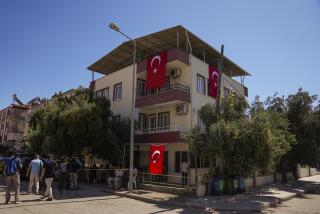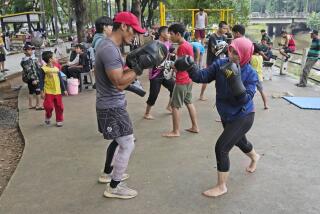Turkish wives battle culture of domestic abuse
- Share via
ISTANBUL, TURKEY — Emine Yaman lies in bed, her legs rigid, her feet prone to sores and swelling. Paralyzed by a bullet that her husband fired into her chest, she is the face of domestic violence in a country struggling to discard long-held cultural practices that denigrate women.
She wears diapers and reaches for a knotted sheet hanging from an overhead bar to shift her upper body. The weak bones in her 40-year-old hips, knees and left arm have broken since the shooting in 1999. Infections induce fevers; she takes antibiotics. A municipal doctor sometimes visits her bare apartment beside a highway in Turkey’s biggest city.
Virtually abandoned by her family, she lives on the kindness of strangers.
Her husband, Ahmet, who did a short stint in jail for shooting her, has filed for divorce, saying she was aggressive. He lives with their teenage son and daughter in his home province of Giresun on the Black Sea coast.
Emine rarely talks to her children, and gets some consolation from refusing to divorce.
“He left me like this,” she said. “Should I divorce him and make him feel comfortable?”
Turkish media and activists have cited Emine Yaman’s story as an extreme example of the consequences of domestic violence in the secular state of more than 70 million people, mostly Muslims. The recent murder of an Italian peace activist hitchhiking in a wedding gown renewed debate about the problem. A man was charged with the killing.
Turkey is still grappling with the issue of violence against women in a largely patriarchal society where the old expressions go: “A beating comes from paradise” and “Don’t keep her without a stick on her back and a baby in her belly.” So tolerable is abuse that in the 1990s, a TV comedy show featured a character who was constantly beaten by her husband.
Last year, a Turkish survey of 1,800 married women found that 1 in 3 was a victim of domestic abuse. Some global estimates are similar.
Turkey has struggled to curb “honor killings,” murders of women deemed to have tarnished the reputation of their relatives, sometimes by having a premarital affair or a child out of wedlock.
Pressed by women’s groups and the European Union, which the country hopes to join, Turkey removed many discriminatory laws, made rape within marriage a crime and barred sexual harassment in the workplace in a 2005 penal code. Activists say enforcement is weak and police and judges need training.
Turkey also is educating thousands of police about domestic abuse with tutors and training videos, and backed an awareness campaign on television.
Some women’s activists support the Islamic-oriented government’s efforts to lift curbs on the wearing of Muslim head scarves, which would make it easier for pious women to get state jobs and education. But they say authorities should devote as much time to domestic violence.
Turkish law requires municipalities of more than 50,000 people to open shelters for women, but many cities don’t provide such help. Traditionally, authorities discourage breakups and urge couples to resolve differences, a path that can prolong the abuse.
In 1989, Emine and Ahmet eloped to escape her parents’ disapproval. A wedding photograph shows the couple seated in a municipal office: Ahmet, lean and dapper, signs a registry and Emine looks on, her head bowed slightly beneath her veil, her face pale with makeup.
They lived in Istanbul, where Ahmet was a caterer.
“During our honeymoon, we saw everything through rose-colored glasses,” Emine said.
Soon, the abuse began. According to Emine, her husband called her a “whore,” slapped her, and once hunted her with a knife. He cheated on her a few times. Emine left him a few times. She always came back, usually after police or family members told them to make peace.
Years later, the family moved to Giresun. A divorce case was pending when Ahmet shot Emine one day in August 1999 after pulling up beside her in a car as she walked with her disabled daughter in her arms.
“He shot at me from inside the vehicle. The bullet passed in front of my face. Then he got out. He gripped me and forced me toward the car, pushing me against it. He placed the gun here and shot once,” said Emine, pointing at her chest. “I fell on the ground. He jumped in the car and went away. I was left in the middle of the street while cars were passing by. Then my son came running. At the time I was thinking: ‘Am I dead, my God?’ The kid was crying near me.”
Emine was paralyzed from the waist down. She said she told authorities that the shooting was an accident so her husband could leave prison and care for their three children, though her disabled daughter later died.
According to Amnesty International, Ahmet was in pretrial detention for a few months and convicted of negligence resulting in threat to life and the possession of an unlicensed pistol. His punishment was reduced to a $1,200 fine because of good behavior during trial, the rights group said.
In a 2001 court letter, Ahmet requested a divorce because of what he described as Emine’s wild behavior, but the case lapsed.
“The defendant locked her children at home and went to unknown places, and did not give the necessary attention to my client or her family, behaving disrespectfully,” reads the letter by Ahmet’s lawyer. “She insulted my client and she could not keep herself from fighting with her neighbors.”
Attempts to interview Ahmet Yaman for this story were unsuccessful.
Emine Yaman said her husband has not paid court-ordered compensation.
“My health problems are piling up,” she said through tears. “How can I forgive that man? Even my God would not forgive him, let alone me.”
Emine has appeared on television programs about violence against women, though her son asked her to stop because it embarrasses him. She survives on donations, including alms at the end of the fasting month of Ramadan.
One day recently, a neighbor back from a pilgrimage to the holy city of Mecca visited with a bag of Saudi dates.
--
Associated Press writer C. Onur Ant contributed to this report.
More to Read
Sign up for Essential California
The most important California stories and recommendations in your inbox every morning.
You may occasionally receive promotional content from the Los Angeles Times.













